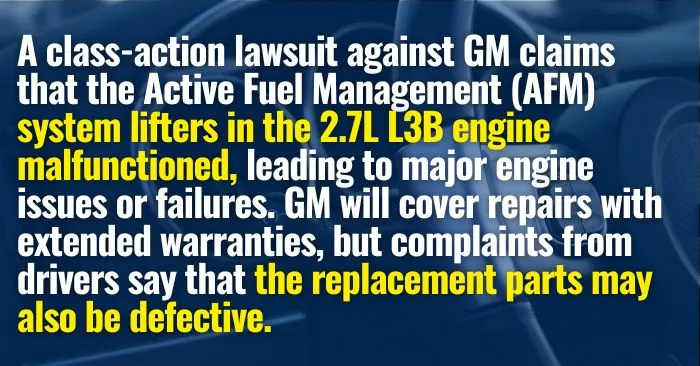
Written By: Jessica Anvar Stotz
Legally Reviewed By: Jessica Anvar Stotz

Short answer: The most frequently reported problems in the Chevy 2.7 Turbo Engine include Active Fuel Management (AFM) system failure, carbon buildup, injector failure, high-pressure fuel pump (HPFP) failure, and turbocharger issues. These issues often arise due to the inherent complexity of modern turbocharged engines, which can lead to various mechanical and electronic failures over time.
Addressing these Chevy 2.7 Turbo engine problems promptly is essential for maintaining its longevity and optimal performance.
In the following sections, we’ll explore these common issues in detail and provide guidance on how to address them effectively.
Problem #1 Active Fuel Management (AFM) System Failure
The AFM system, designed to improve fuel efficiency by deactivating some cylinders during light driving, often fails. This can lead to excessive oil consumption, low engine power, sudden stalling, and hesitant acceleration
- What it is: The Active Fuel Management (AFM) system is designed to improve fuel efficiency by deactivating certain cylinders when full engine power is not required. This system allows the engine to run on fewer cylinders during light driving conditions, reducing fuel consumption and enhancing efficiency.
- Potential causes: AFM system failure can be caused by several factors. Mechanical wear and tear on components such as lifters and solenoids may occur over time. Oil-related issues, like low oil levels or using poor-quality oil, can also negatively affect the AFM system’s performance. Additionally, electronic malfunctions, such as faulty sensors or control modules, may disrupt the system’s operation.
- Symptoms: Common symptoms of AFM system failure include excessive oil consumption, where the engine uses more oil than usual. A noticeable reduction in engine power may occur, leading to diminished performance. The engine may also experience sudden stalling, especially when idling or driving at low speeds. Hesitant acceleration is another possible sign, where there is a delay or sluggish response when attempting to accelerate.
- Potential fix: Regular maintenance is essential to avoid AFM system issues. This includes staying on top of oil changes and using high-quality oil to ensure proper lubrication of the system’s components. Monitoring the system for any signs of malfunction or wear can help catch issues early, and professional inspection should be sought if symptoms appear. In cases where components such as lifters or solenoids are failing, replacement may be necessary. For persistent problems, disabling the AFM system could be considered, although this may lead to reduced fuel efficiency.
Problem #2 Carbon Buildup
Carbon buildup on intake valves is a common issue in direct-injection engines like the Chevy 2.7 turbo. This can lead to reduced engine performance, rough idling, and poor fuel economy.
- What it is: Carbon buildup refers to the accumulation of carbon deposits on the intake valves and other engine components. This issue is particularly common in direct-injection engines, where fuel is injected directly into the combustion chamber, bypassing the intake valves and leaving them vulnerable to carbon deposits.
- Potential causes: Carbon buildup is often caused by the nature of direct fuel injection, which does not allow fuel to clean the intake valves as it does in port fuel injection systems. Using low-quality fuel that lacks adequate detergents can exacerbate this issue. Additionally, frequent short trips where the engine doesn’t reach its optimal operating temperature can lead to faster carbon buildup over time.
- Symptoms: When carbon buildup occurs, you might notice reduced engine performance, with a decrease in power and slower acceleration. The engine may also idle roughly or inconsistently. Poor fuel economy is another common symptom, as increased fuel consumption can signal the presence of carbon deposits. In more severe cases, engine misfires, particularly during cold starts, can occur due to carbon buildup.
- Potential fix: One way to address carbon buildup is through periodic cleaning of the intake valves using specialized cleaning solutions or methods such as walnut blasting. Using high-quality fuel with sufficient detergents can help prevent the buildup of carbon deposits over time. Installing an oil catch can is another preventive measure, as it helps prevent oil vapors from reaching the intake valves. If the buildup is severe, seeking professional cleaning services may be necessary to restore the engine’s performance to optimal levels.
Problem #3 Injector Failure
Fuel injectors in the Chevy 2.7 turbo can fail, leading to misfires, rough running, and poor fuel economy. This is often due to the high pressures and temperatures in the turbocharged engine.
- What it is: Injector failure occurs when the fuel injectors, which are responsible for delivering fuel into the engine’s combustion chamber, malfunction. This disruption can lead to improper fuel delivery, negatively affecting the engine’s performance and overall efficiency.
- Potential causes: Injector failure can be caused by the high pressures and temperatures commonly found in turbocharged engines, which put significant strain on the injectors over time. Contaminated fuel containing dirt, debris, or water can clog or damage the injectors, leading to malfunctions. Additionally, electrical issues such as faulty wiring or connectors may contribute to injector failures.
- Symptoms: When fuel injectors fail, engine misfires are a common symptom, particularly noticeable under load or during acceleration. The engine may also run roughly or inconsistently, and you might experience a decrease in fuel efficiency, as injector problems often lead to increased fuel consumption. Another indicator could be the check engine light, which may be triggered by the vehicle’s diagnostic system due to injector malfunction.
- Potential fix: To prevent injector failure, regular inspection and cleaning of the fuel injectors are essential to avoid clogging and buildup. Using high-quality fuel can reduce the risk of contamination that damages the injectors. Fuel additives designed to clean and protect injectors can also be beneficial. However, if injectors are already damaged or clogged, they may need to be replaced by a professional mechanic to restore proper engine function.
Problem #4 High-Pressure Fuel Pump (HPFP) Failure
The HPFP is critical for maintaining the high fuel pressures needed in a turbocharged engine. Failure of the HPFP can cause engine stalling, poor acceleration, and difficulty starting the engine
- What it is: The High-Pressure Fuel Pump (HPFP) is responsible for delivering fuel at high pressure to the engine’s fuel injectors. This function is essential for turbocharged engines, which require precise and pressurized fuel delivery to operate efficiently.
- Potential causes: HPFP failure can be caused by wear and tear over time, as the pump operates under intense pressures and temperatures. Fuel contamination, such as dirt, debris, or water in the fuel, can also damage the HPFP. Additionally, mechanical failure of internal components like seals and bearings can lead to malfunction.
- Symptoms: A failing HPFP often leads to engine stalling, particularly during acceleration or when the engine is under load. Drivers may also experience poor acceleration, with noticeable lag or hesitation when pressing the gas pedal. Difficulty starting the engine, especially in cold conditions, is another common symptom. In some cases, the check engine light may be triggered by the vehicle’s diagnostic system due to HPFP issues.
- Potential fix: To prevent HPFP failure, regular maintenance is essential, including routine inspections to ensure the pump is functioning properly. Using high-quality fuel can minimize the risk of contamination, and regularly replacing the fuel filter helps prevent dirt and debris from reaching the HPFP. If the pump shows signs of failure, it should be replaced by a professional mechanic to prevent further damage to the engine.
Problem #5 Turbocharger Issues
The turbocharger can suffer from impeller damage, bearing wear, or oil leaks, leading to reduced boost pressure, decreased engine power, and increased exhaust emissions.
- What it is: A turbocharger is a device that boosts an engine’s efficiency and power output by forcing extra air into the combustion chamber. Operating under high pressure and temperature, it helps the engine generate more power, but these conditions also make the turbocharger vulnerable to various issues.
- Potential causes: Turbocharger problems can arise from impeller damage, which is often caused by debris or foreign objects entering the system. Bearing wear is another common issue, as the bearings that support the turbocharger’s shaft deteriorate over time. Oil leaks or insufficient lubrication can lead to turbocharger failure, while overheating from excessive heat buildup can also damage its components.
- Symptoms: One symptom of turbocharger issues is reduced boost pressure, leading to noticeable declines in engine power and slower acceleration. Increased exhaust emissions are another potential sign of a malfunctioning turbocharger. A high-pitched whining noise from the engine bay is a distinctive indicator of trouble, and the vehicle’s diagnostic system may trigger the check engine light if turbocharger problems are detected.
- Potential fix: To prevent turbocharger issues, regular inspection for signs of wear or damage is crucial. Proper lubrication is essential, so it’s important to check for oil leaks and ensure the turbocharger is well-lubricated. Maintaining the engine’s cooling system can also help prevent overheating, which is a common cause of turbocharger failure. If the turbocharger is damaged, it may need to be repaired or replaced by a professional mechanic.

Is There a Recall for Chevy’s 2.7 Turbo Engine?
Yes, there have been recalls and issues associated with Chevy’s 2.7L Turbo engine. For the 2023 Chevy Silverado 1500, GM launched a Customer Satisfaction Program to address engines manufactured with cracks in the engine block. This problem extended to some units of the 2023 Chevy Colorado as well.
In addition, a recall was issued for certain 2023 Chevy Silverado 1500 and 2023 Chevy Colorado models due to fuel injectors with incorrect fuel flow rates. Affected vehicles may fail to meet emissions standards.
Who Pays for the Problems I’m Having?
If your Chevy 2.7L Turbo engine is experiencing issues covered by a recall or a Customer Satisfaction Program, General Motors (GM) will typically handle the repair costs.
For example, GM has implemented programs to replace engines with manufacturing defects, such as cracks in the engine block.
If your issue is not included in a recall or warranty, however, you may be responsible for the repair expenses.
We recommend checking with your dealer or GM customer service to see if any applicable programs or extended warranties can assist with covering the costs.
How Hiring a Lemon Law Attorney Can Help
If you’re facing problems with your Chevy 2.7L Turbo engine, consulting a knowledgeable lemon law attorney can be highly beneficial.
A legal expert in lemon law or consumer rights can help you determine whether you have a valid claim.
They can guide you through the process, which may involve seeking repairs, a vehicle replacement, or financial compensation.
Lemon law attorneys are skilled in negotiating with auto manufacturers like GM or dealerships on your behalf.
If legal action is necessary, they will represent you in court, manage filings, and work to secure a favorable outcome.
Many of these attorneys work on a contingency basis, meaning GM could cover your legal fees if you win your case.
To ensure you receive the compensation and justice you deserve, consider reaching out to the Lemon Law Experts.
The Lemon Law Experts specialize in supporting individuals with defective Chevy vehicles, including the 2.7L Turbo engine.
Since 2009, we have helped clients achieve significant refunds and compensation from leading auto manufacturers. For more information and to see how our legal experts can assist you, get in touch with us today.
Citations
GM Authority. (2024, February). GM to replace 2023 Chevy Silverado Turbo 2.7L engines produced with cracked blocks. Retrieved from https://gmauthority.com/blog/2024/02/gm-to-replace-2023-chevy-silverado-turbo-2-7l-engines-produced-with-cracked-blocks/
GM Authority. (2024, January). Chevy Silverado, Colorado recalled for 2.7L engine fuel injector issue. Retrieved from https://gmauthority.com/blog/2024/01/chevy-silverado-colorado-recalled-for-2-7l-engine-fuel-injector-issue/




